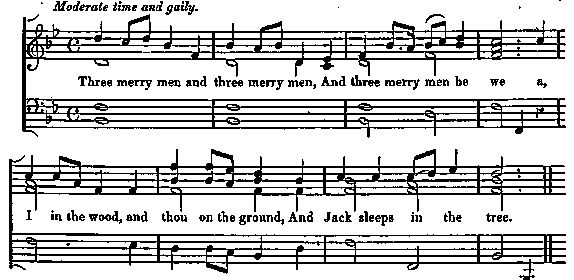Popular Music Of The Olden Time Vol 1
Ancient Songs, Ballads, & Dance Tunes, Sheet Music & Lyrics - online book
| Share page | Visit Us On FB |
|
|
||
|
16 ENGLISH SONG AND BALLAD MUSIC |
||
|
|
||
|
THREE MERRY MEN BE WE. This is quoted in the same passage in Twelfth Night as Peg-a-Bamsey. The tune is contained in a MS. common-place book, in the handwriting of John Playford, the publisher of The Dancing Master, in the possession of the Hon. George O'Callaghan." The words are also in Peele's The Old Wives' Tale, 1595 (Dyce, i. 208), where it is sung instead of the song proposed, 0 man in desperation.
In the comedy of Laugh andlie down, 1605, " He plaied such a song of the Three Merry Men." In Fletcher's The Bloody Brother, the Cook, who-is about to be hung with two others, says:
" Good Master Sheriff, your leave too; This hasty work was ne'er done well: give us so much time As but to sing our own ballads, for we'll truBt no man, Nor no tune but our own; 'twas done in ale too, And therefore cannot be refus'd in justice : Your penny-pot poets are such pelting thieves, They ever hang men twice." Each then sings a song, and they join in the chorus of—
" Three merry hoys, and three merry boys, • And three merry boys are we, As ever did sing in a hempen string Under the gallow tree."—Act iii., sc. 2,—Dyce, x. 428. "Three merry men be wo" is also quoted in Westward Hoe, by Dekker and Webster, 1607; and in Bam Alley, 1611. |
||
|
|
||
 |
||
|
|
||
|
I LOATHE THAT I DID LOVE. On the margin of a copy of the Earl of Surrey's poems, in the possession of Sir W. W. "Wynne, some of the little airs to -which his favorite songs were sung are written in characters of the times. Dr.' Nott printed them from that copy in his edition of Surrey's Songs and Sonnets," 4to., 1814. From this the first tune for " I loathe that I did love " is taken. The second is from a MS. containing songs to the lute, in the British Museum (Addit. 4900), but it is more like the regular composition of a musician than the former.
• The music was added after a portion of the edition had been circulated. |
||
|
|
||